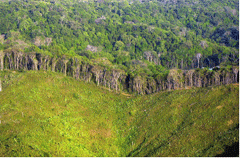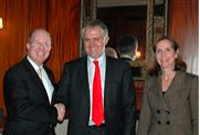Deforestation Down Under
Air Date: Week of July 27, 2007

Deforestation in Panama (Courtesy of the US State Department)
A global conference in Australia tackles the problem of deforestation and climate change. Australia’s Minister of Environment Malcolm Turnbull tells host Bruce Gellerman about why trees matter and about his country’s new initiative to use satellites to monitor the world’s forests.
Transcript
GELLERMAN: It’s Living on Earth. I’m Bruce Gellerman. It’s estimated four and a half million trees, equal to about 70 thousand football fields of forest, are destroyed each day. Bad news because the world’s forests have a tremendous effect on climate change: Trees filter billions of tons of carbon dioxide from the air. Cut down the trees, we lose the filter. Burn the forests down and billions of tons of the greenhouse gas are released into the atmosphere. This past week, senior government officials from 70 countries met in Australia at the world’s first high-level meeting on forestry and climate change. At the meeting Australia’s Environment Minister Malcolm Turnbull announced a five-year, 175 million dollar initiative to use satellites to monitor the world’s forest. We reached Minister Turnbull by phone at the Sydney airport.
TURNBULL: What we’re able to do through our global initiative on forests and climate is work with other countries to incorporate our sustainable forestry into the battle against climate change. Now one of the most important things we need to do is to monitor increases and decreases in forest cover and also monitor carbon emissions. Now, we have very advanced techniques to do that in Australia and so what we want to do is to work with other countries to set up a global forest monitoring and carbon monitoring network. What that will mean is, before too long we will be able to have a very good idea of what’s happening with the world’s forest both in terms of net hectareage of coverage and also what’s happening in terms of their contribution to the carbon cycle.
GELLERMAN: But everyone knows that there’s illegal logging going on in Brazil and Indonesia, that there’s clear cutting of the forest and burning down of the forest but now what? What do you do with this information?
TURNBULL: Well, ultimately it’s up to national governments to enforce their own laws. All countries are working very hard to fight against illegal logging, but ultimately you need compliance and enforcement on the ground. Now, the kind of satellite and radar data that a network of this kind can deliver of course makes enforcement a lot easier.
GELLERMAN: Now critics say that Australia imports 400 million dollars worth of contraband timber every year. Your plan is a five-year plan for 175 million dollars. They say your plan is a drop in the bucket against these illegal imports.
TURNBULL: Well, you’re not comparing apples with apples. The 400 million dollar figure is an absolute guesstimate. And the bulk of the illegal timber imports is timber that is contained in furniture. It is hard I would say or well nigh impossible to know whether the timber that is in a chair or table that’s come from China had its origin in illegal or legally cut timber. Now we need to try to develop ways in which we can get certification right back to the source.
GELLERMAN: Well, right now there’s no incentive for loggers not to cut the forests down.
TURNBULL: This is what we’re focused on. You see what you’ve got is a market failure in that the carbon cost is not being factored into forestries. The classic case is the way the Kyoto Protocol in effect encourages deforestation. There is an incentive for countries to use biofuels such as palm oil because they’re seen as a renewable energy resource. However, to grow that palm oil you need land and often that land is being provided by rainforest that is being clear felled. Now having said that it is a weakness that is widely recognized and we are committed to addressing it in the next round of Kyoto, in Kyoto two if you like.
GELLERMAN: What’s been the United State’s reaction to your initiative and to the conference?

Left to right: White House Environmental Chair James Connaughton, Environment Minister for Australia Malcolm Turnbull, US Undersecretary for Democracy/Global Affairs Paula Dobriansky (Courtesy of Malcolm Turnbull)
TURNBULL: Oh, they’ve been very supportive. The U.S. was the first government - it and Indonesia - were the two first governments to support our initiative. But the important thing that we’ve achieved I think is that we’ve succeeded in lifting the profile of this issue in the climate change debate up several notches. And I don’t think there will be any difficulty in ensuring that forestry is a key part of the new climate change agenda, the post-Kyoto agenda that will begin to be framed in earnest at Bali later this year.
GELLERMAN: It seems to me surprising that it’s taken governments so long to actually address the problem of forests and greenhouse gases.
TURNBULL: Uh, yes, it’s always puzzled me. It is in many respects the least cost abatement opportunity. And of course there are so many other benefits. There are benefits to biodiversity. There are benefits to water quality. Better management of the world’s forests ticks every box.
GELLERMAN: Ok, well I know you have a plane to catch, I’ll let you go. I want to thank you very much.
TURNBULL: No, thank you.
GELLERMAN: Speaking to us on a phone in Sydney’s airport is Australia’s Environment Minister, Malcolm Turnbull.
[MUSIC: The Beta Band “The House Song” from ‘The Three E.P.s’ (Astralwerks - 1999)]
Links
Living on Earth wants to hear from you!
Living on Earth
62 Calef Highway, Suite 212
Lee, NH 03861
Telephone: 617-287-4121
E-mail: comments@loe.org
Newsletter [Click here]
Donate to Living on Earth!
Living on Earth is an independent media program and relies entirely on contributions from listeners and institutions supporting public service. Please donate now to preserve an independent environmental voice.
NewsletterLiving on Earth offers a weekly delivery of the show's rundown to your mailbox. Sign up for our newsletter today!
 Sailors For The Sea: Be the change you want to sea.
Sailors For The Sea: Be the change you want to sea.
 The Grantham Foundation for the Protection of the Environment: Committed to protecting and improving the health of the global environment.
The Grantham Foundation for the Protection of the Environment: Committed to protecting and improving the health of the global environment.
 Contribute to Living on Earth and receive, as our gift to you, an archival print of one of Mark Seth Lender's extraordinary wildlife photographs. Follow the link to see Mark's current collection of photographs.
Contribute to Living on Earth and receive, as our gift to you, an archival print of one of Mark Seth Lender's extraordinary wildlife photographs. Follow the link to see Mark's current collection of photographs.
 Buy a signed copy of Mark Seth Lender's book Smeagull the Seagull & support Living on Earth
Buy a signed copy of Mark Seth Lender's book Smeagull the Seagull & support Living on Earth

